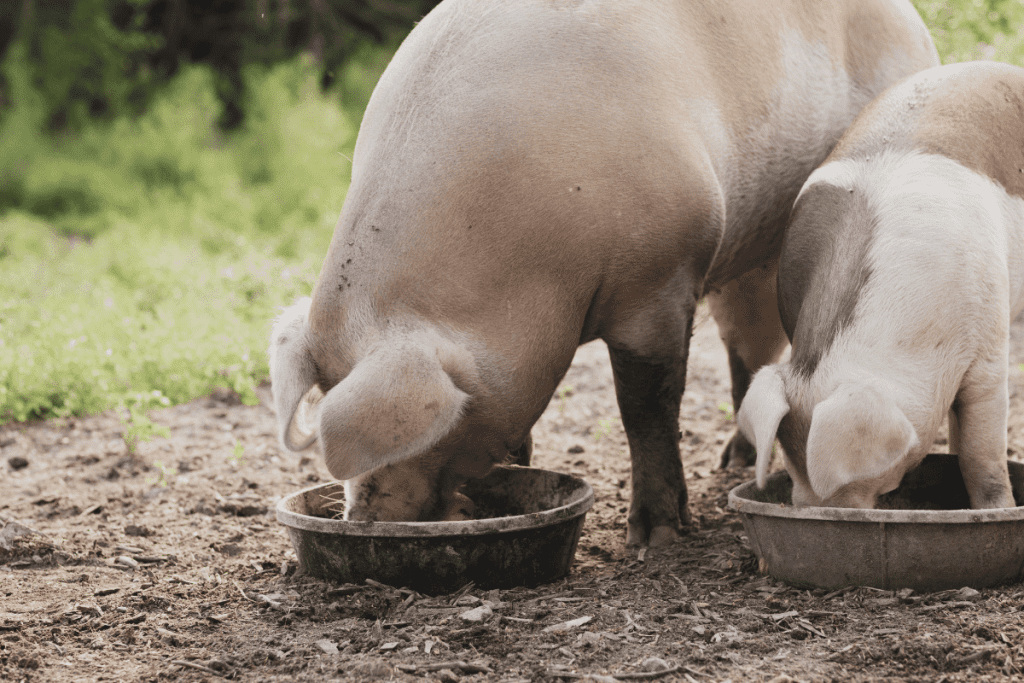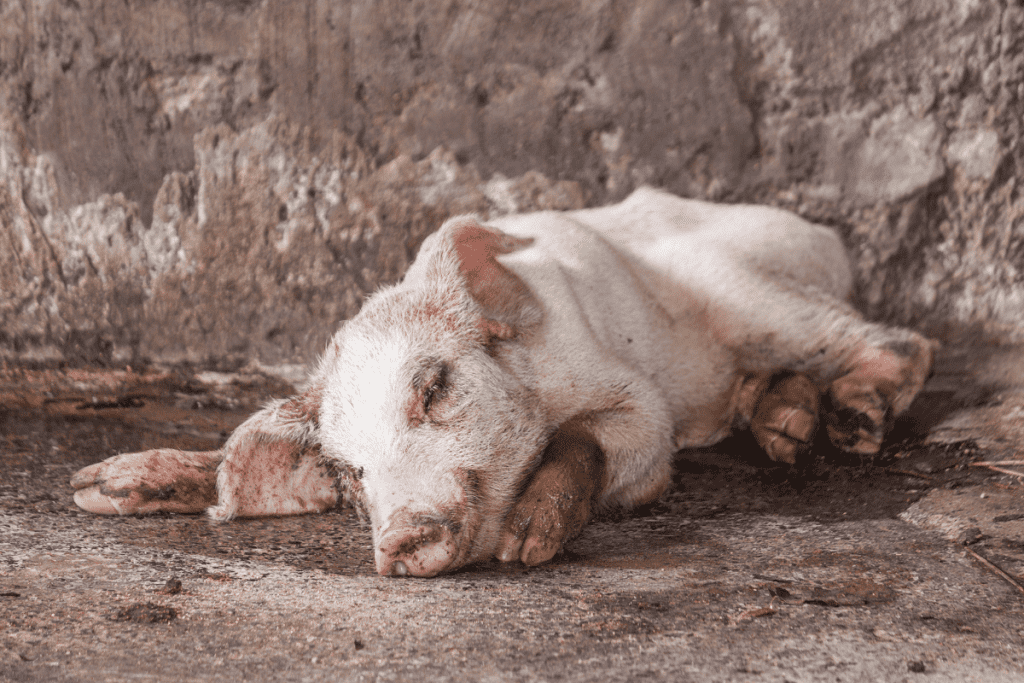People who have pigs are likely aware of how pigs will happily eat just about anything served up to them.
But what about meat?
Is it ethical and healthy for pigs to eat animals products?
As omnivores, it is perfectly natural and healthy for pigs to consume meat. However, it is important to carefully manage your pig’s meat consumption to reduce the risk of disease transmission, avoid accidentally encouraging hunting and other dangerous farm behavior, and even breaking the law in some places.
Answering this question depends a lot on the context.
There are location-based restrictions on feeding pigs meat and several potential health risks to consider when making this decision for yourself.
Read on for more detailed information on when it’s OK to give your pigs meat and some of the associated risks.

Table of Contents
ToggleIs It OK To Give Pigs Meat?
From a biological and theoretical standpoint, pigs are equipped to digest and benefit from meat consumption. Pigs are omnivores and can eat meat as well as plant-based foods.
They are omnivorous animals just like humans, and a natural diet for pigs includes a healthy balance of:
- Insects
- Greens
- Green lettuce
- Kale
- Spinach
- Snow peas
- Vegetables
- Beets
- Carrots
- Cooked Broccoli
- Fruits
- Apples
- Oranges
- Pitted cherries
- Pitted peaches
- Grains
- Mushrooms
- Small mammals
Pigs have a reputation for eating everything under the sun.
Still, while pigs can technically eat a wide range of things (and are likely to scarf down any type of food presented to them!), it is not necessarily in their best interest or yours.
Learn more about the role of food in the real cost of owning pigs.
Pigs will certainly enjoy meat, and it also provides them with the protein and nutrients needed to grow quickly.
The following types of meat are generally OK for pigs:
- Cooked fish
- Earthworms
- Grubs
- Cooked poultry intestines
- Meat meal processed commercially (these are usually animal by-products such as fat, trimmings, and blood extracted, heated, ground, and dried)
In terms of health and safety, “rendered” meat products are less likely to contain viruses and other dangerous pathogens.
The rendering process involves cooking the material in boiling water for at least 30 minutes.
Why Is Meat Bad For Pigs?
Eating raw meat or even products contaminated via contact with meat can transmit viruses and diseases in pigs, such as African Swine Fever and Foot and Mouth Disease.
Because pigs are not picky when it comes to their meals, many people are tempted to save money and time by feeding their meat scraps and other food scraps to pigs.
However, careless practices regarding food waste and the quality of meat have led to some serious health problems in pigs and other livestock.
The main argument for prohibiting and/or regulating the consumption of meat and food waste by pigs is the risk of spreading fatal and contagious diseases to both pigs and humans.
Two of these known dangerous diseases include African Swine Fever and Foot and Mouth Disease.
African Swine Fever
Although African Swine Fever thankfully cannot be transmitted to humans, it is a serious and highly contagious virus that can affect pigs of all ages.
It has spread to many countries worldwide, from the European Union to East Asia, to the Dominican Republic and Haiti.
African Swine Fever is spread through ticks, contact with infected meat, and direct or indirect contact with infected pigs, feces, or body fluids.
This disease causes hemorrhagic fever and most often leads to rapid death of the pig and spreads to other pigs.
There is currently no vaccine available for African Swine Fever.
Many governments and agricultural organizations regulate the consumption of meat by pigs to avoid spreading this virus, particularly in areas where it has not yet appeared, such as the United States and Australia.
Once an outbreak has occurred, it is eliminated by depopulating any infected or exposed animals, making it a devastating disease and costly illness for livestock producers.
Foot and Mouth Disease
Foot and Mouth Disease virus is often spread through infected pork products.
Some outbreaks are specifically caused by pigs eating infected, uncooked meat scraps.
It is highly contagious, especially among pigs, and can spread through aerosol transmission and contact with infected fluids.
This virus can even survive for long periods in frozen meat products.
Foot and Mouth Disease rarely affects humans, but it does affect other cloven-hoofed animals and is potentially transmissible to humans.
Do Pigs Get Sick from Eating Raw Meat?

Pigs will sometimes get sick from eating raw meat. Before feeding meat products to pigs, check with your local regulations and make sure they are cooked to avoid spreading bacteria and diseases to your pigs.
The risk for the diseases I have mentioned above, African Swine Fever and Foot and Mouth Disease, is higher for raw meat consumption.
Bacteria and viruses will multiply under certain environmental conditions (warm temperatures and moisture in particular), but high temperatures are sufficient to eliminate these microbes.
The North American Renderers Association document gives detailed information about the temperatures and times needed to properly render meat to kill any pathogenic bacteria and viruses.
These temperatures vary depending on the type of virus or bacteria and the duration of cooking.
The U.S. Department of Agriculture requires all food scraps to be cooked for at least 30 minutes at 112° degrees Fahrenheit (44° C) before feeding it to pigs.
Even if you are not feeding raw meat to your pigs directly, kitchen scraps and animal by-products can still be contaminated if they have come into contact with infected meat.
Gross fact! Pigs will eat their own poop, and it’s normal.
Learn more in our article if you dare.
Hunting Habits after Eating Raw Meat
In addition to the risk of illness, feeding pigs raw meat also risks the pigs developing a taste for raw flesh and blood.
In a farm or homestead environment, it’s easy to imagine why this is a bad scenario for your other livestock and pets.
For example, pigs have started hunting chickens after tasting the raw poultry.
Pigs enjoy meat quite a lot, so they are more likely to attempt to satisfy the craving once they have tasted it.
Is Feeding Meat to Pigs Illegal?
In some places, the feeding of meat to pigs is regulated, while in other places, it is outright illegal, such as in the United Kingdom and Australia. Check the updated rules in your state or country to confirm the feeding regulations for pigs.
This question is also indirectly impacted by your region’s regulations surrounding garbage feeding.
Since contaminated pork and other meat products may be mixed in with other food scraps or may have come into contact with food scraps, the rules around feeding pigs human food waste are very strict.
According to the Swine Health Protection Act passed in 1980 in the United States, all pig owners must obtain a special license to feed their pigs food waste containing or having contacted meat, poultry, and fish.
Once the license is obtained, these types of food still have to be cooked at 212° degrees Fahrenheit (100° C) for 30 minutes before they are used as pig feed.
However, each U.S. state can still decide individually whether to allow garbage feeding, so be sure to check your state’s policy.
Some legal restrictions also differentiate between meat products from outside the farm versus meat products produced on your farm.
If your goal is to save money on pig feed, consider incorporating by-products such as bakery products and eggs– these tend to be less strictly regulated.
Do Pigs Eat Pork?
Pigs will eat pork given the opportunity. It seems terrifying to us to eat one’s species, but it’s entirely natural for pigs. Eating raw pork carries the same risk as other meats.
Although there is an ethical argument against giving pigs pork, cannibalism is also relatively common throughout the animal kingdom.
It does not quite have the same implications as it does among humans.
What Foods Are Bad For Pigs?
Contrary to their reputation as eating machines, some foods are, in fact, bad for pigs.
In addition to some meat and animal products, below is a list of some common garden foods to avoid feeding your pig:
- Unripened Tomatoes
- Raw Potatoes
- Celery
- Onions
- Parsley
- Rhubarb
- Cherry Tree Leaves
Many types of weeds and plants are toxic to pigs, so if your pig is grazing, be very mindful of what species they have access to.
Your local agricultural department should have information on common plants specifically in your area to avoid.
This list is far from exhaustive, but the following plants are toxic to pigs:
- Mustards
- Nightshades
- Bracken Fern
- Crown Vetch
- Rhododendrons
- St. John’s Wort
Lastly, always avoid feeding pigs any moldy food or rotting food.
A good rule of thumb is to avoid feeding your pigs anything you wouldn’t eat yourself!
Commercial pig feed is always a safe route, as these are specially formulated to provide all of the essential nutrients and vitamins needed to keep your pig healthy.
How useful was this post?
Click on a star to rate it!
We are sorry that this post was not useful for you!
Let us improve this post!
Tell us how we can improve this post?
